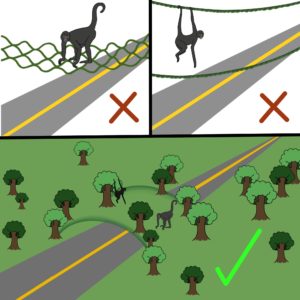ARTÍCULOS EN REVISTAS INDEXADAS Y CAPÍTULOS EN LIBROS EDITADOS
2024
Pozo-Muntoy G, Aguilar-Cucarachi M del S, Aureli F, Briseño-Jaramillo M, Canales-Espinosa D, Cárdenas-Navarrete A, Cortés-Ortiz L, Coyohúa-Fuentes A, Espinosa-Gómez FC, Franquesa-Soler M, García-Duran C, García-Ojeda Y, González-Acosta R, Hermida-Lagunes J, Hernández-Salazar LT, Jasso-del Toro C, Lizama-Hernández JA, Martínez-Ramos IZ, Montejo-Zetina EJ, Núñez-Martínez G, Nuñez-Ramírez PY, Pareja-Badillo PS, Rivera-Sánchez AF, Sánchez-Domínguez E, Serio-Silva JC, Smith Aguilar SE, Solórzano-García B, Spaan D, Van Belle S & Dias PAD. 2024. Howler Monkey Die-Off in Southern Mexico. American Journal of Primatology.
Pinel-Ramos EJ, Aureli F, Wich S, Petersen MF, Dias PAD & Spaan D. 2024. Are drones a source of disturbance? Assessing the behavioral responses of Geoffroy’s spider monkeys to exposure to drone flights. Drones, 8 (9), 500. https://www.mdpi.com/2504-446X/8/9/500
Pinel-Ramos EJ, Aureli F, Wich S, Longmore S & Spaan D. 2024. Evaluating thermal-infrared drone flight parameters on spider monkey detection in tropical forests. Sensors, 24(17), 5659, https://doi.org/10.3390/s24175659.
Epply et al., 2024. Tropical field stations return a high conservation return on investment. Conservation Letters, e13700, http://doi.org/10.1111/conl.13007
Pietrangeli E, Saldaña-Sanchez AA, Spaan D & Aureli F. 2024. Let’s not use it! A dynamic no-use zone between the home ranges of two spider monkey groups. Primates, https://link.springer.com/article/10.1007/s10329-024-01119-7
Carballo-Morales JD, Hernández-Montero JR, Ríos-Chelén AA, Vázquez-Domínguez G, Aguilar-Cucurachi S, Avila-Flores R … Spaan D. Aceptado. Bats in tropical cities: a view since the ecology in, of and for cities. In: Angeoletto F, Tryjanowski P y Fellowes M (Ed.) Ecology of Tropical Cities: Natural and Social Sciences Applied to the Conservation of Urban Biodiversity. Springer Nature Publishers.
2023
Hutschenreiter A, Galán-Acedo C, Spaan D & Aureli F. 2023. Survey methods and hierarchical modeling for Mexican primates. In: Mandujano S, Narajo EJ & Andrade-Ponce GP (Ed.) Neotropical Mammals: Hierarchical Analysis of Occupancy and Abundance. Springer Nature Publishers. Pp. 128-157. https://doi.org/10.1007/978-3-031-39566-6_6
Millington L, Razafindratsima OH, McKinney T & Spaan D. 2023. The emerging importance of regenerating forests for primates in anthropogenic landscapes. McKinney T, Waters S & Rodrigues MA (Eds.) Primates in Anthropogenic Landscapes: Exploring Primate Behavioural Flexibility Across Human Contexts. Springer. pp 29-44. https://link.springer.com/chapter/10.1007/978-3-031-11736-7_3
Franquesa-Soler M & Spaan D. 2023. Primates mexicanos en zonas urbanas: resiliencia biológico y un reto compartido. PROFEPA (Ed.). 30 Años de Derecho, Justicia, Procuración Ambiental en Mexico. Tomo 2. Procuraduría Federal de Protección al Ambiente (Profepa). pp 21 – 27.
Franquesa-Soler M, Spaan D, Hernández-Jaramillo A & Andresen E. 2023. Citizen´s perceptions on urban black howler monkeys (Alouatta pigra) in the city of Palenque (Mexico): a case study to aid policy decisions. International Journal of Primatology. https://link.springer.com/article/10.1007/s10764-022-00339-2?fbclid=IwAR23SE905Kn1ajsTlCpiCeg7m2DnWD8AVUycVBRVHo04tQbLv8IzQFQzPBI
2022
Méndez-Carvajal PG, Rodríguez ME, Pozo-Montuy G, Chaves ÓM, Sánchez-Porras R, Gutiérrez-Pineda K, Spaan D, Pinel Ramos EJ & Zaldaña-Orantes K. 2022. Geoffroy´s spider monkey Ateles geoffroyi Kühl, 1820. In: Mittermeier RA, Reuter, KE, Rylands, AB, Jerusalinsky L, Schwitzer C, Strier KB, Ratsimbazafy J & Humle T (eds.), Primates in Peril: The World’s 25 MostEndangered Primates 2022–2023, pp. 8–10. IUCN SSC Primate Specialist Group, International Primatological Society, Re:wild, Washington, DC. https://www.researchgate.net/publication/363207780_GEOFFROY’S_SPIDER_MONKEY_Ateles_geoffroyi_Kuhl_1820
Hutschenreiter A, Kallan A, Bonilla-Moheno M, Morales-Mavil JE, Mandujano-Rodriguez S., Briseño-Jaramillo M, Spaan D & Aureli F. 2022. Spider monkeys (Ateles geoffroyi) cope with anthropogenic pressure in a low-impact tourism area: insights from a multi-method approach. International Journal of Primatology https://link.springer.com/article/10.1007/s10764-022-00310-1
Aureli F, Hutschenreiter A, Araya Gamboa D, Arévalo-Huezo E, Avila Atauga T, Boiledieu C, González-Gallina A, Lindshield S, Narváez-Rivera G, Rufray V, Thurber M & Spaan D. 2022. Do spider monkeys use artificial canopy bridges to cross linear infrastructure? Folia Primatologica https://brill.com/view/journals/ijfp/aop/article-10.1163-14219980-20211204/article-10.1163-14219980-20211204.xml?fbclid=IwAR1ujPtvW1NgVgh-Kk_014ktJ54QtiB4FhJwkFfODgo-vDTwUpt6Y_bqfTA

Beltrán Frances V, Spaan D, Amici F, Maulany RI, Oko NP & Majolo B. 2022. Effect of anthropogenic activities on the population of moor macaques (Macaca maura) in South Sulawesi, Indonesia. International Journal of Primatology, 43(2), 339–359 https://link.springer.com/article/10.1007/s10764-022-00279-x
Wich SA, Spaan D, Pintea L, Delahunty R & Kerby J. 2022. UAVs in conservation research. Eltner A, Hoffmeister D, Kaiser A, Karrasch P, Klingbeil L, Stöcker C & Rovere A. (Eds.) UAVs in Environmental Sciences. Wbg Academic. Open access: https://files.wbg-wissenverbindet.de/Files/Article/ARTK_ZOA_1028514_0001.pdf 2018
Spaan D, Di Fiore A, Rangel-Rivera CE, Wich S & Aureli F. 2022. Detecting spider monkeys from the sky using a high-definition RGB camera: a rapid assessment survey method? Biodiversity and Conservation https://link.springer.com/article/10.1007/s10531-021-02341-1
Spaan D, Ramos-Fernández G & Aureli F. 2022. Resurveying primate populations: A comparison of methods to monitor change over time. Primate Conservation, 36, 15-21. http://static1.1.sqspcdn.com/static/f/1200343/28484992/1638021891223/PC36_Spaan_et_al_resurvey_primate_pops.pdf?token=pTuWrGOUY8nybrJWj89bxp%2F5b7A%3D
2021
Galán-Acedo C, Spaan D, Bicca-Marques JC, Bocorny de Azevedo R, Villalobos F & Rosete-Vergés F. 2021. Regional deforestation drives the impact of forest cover and matrix quality on primate species richness. Biological Conservation, 263, 109338. https://www.sciencedirect.com/science/article/abs/pii/S0006320721003906
Spaan D, Ramos-Fernández G, Bonilla-Moheno M, Schaffner CM & Aureli F. 2021. The impact of the establishment of Otoch Ma´ax Yetel Kooh Protected Area (Yucatan, Mexico) on populations of two Neotropical primates. PARKS, 27 (1), 35-42.
Delgado-Martínez CM, Spaan D, Contreras-Moreno FM, Simá-Pantí DE & Mendoza E. 2021. Spider monkey use of natural and artificial terrestrial water sources in Calakmul, Mexico, Behaviour, 1-15. doi: https://doi.org/10.1163/1568539X-bja10056
2020
Spaan D, Ramos-Fernández G, Bonilla-Moheno M, Schaffner C, Slater K, Morales- Mávil JE & Aureli F. 2020. Anthropogenic habitat disturbance and food availability affect the abundance of an endangered primate: a landscape-scale approach. Mammalian Biology, 100, 325-333.
2019
Spaan D, Burke C, McAree O, Aureli F, Rangel-Rivera CE, Hutschenreiter A, Longmore S & Wich S. 2019. Thermal infrared imaging from drones as a major advance for spider monkey surveys. Drones, 3(2), 34, DOI:10.3390/drones3020034 https://www.mdpi.com/2504-446X/3/2/34
Nijman V, Ardiansyah A, Bergin D, Birot H, Brown E, Langgeng A, Morcatty T, Spaan D, Siriwat P, Imron MA & Nekaris KAI. 2019. Dynamics of illegal wildlife trade in Indonesian markets over two decades illustrated by trade in Sunda leopard cats. Biodiversity, 1-14, DOI:10.1080/14888386.2019.1590236
Spaan D, Ramos-Fernández G, Smith-Aguilar S, Schaffner CM, Pinacho-Guendulain B & Aureli F. 2019. Standardizing methods to estimate population density: an example based on habituated and unhabituated spider monkeys. Biodiversity and Conservation, 28 (4), 847-862.
2018
Svensson MS, Nekaris KAI, Bearder SK, Bettridge C, Butynski TM, Cheyne SM, Das N, de Jong YA, Luhrs AM, Luncz L, Perkin A, Pimley E, Pointdexter S, Spaan D, Stark DJ, Starr C & Nijman V. 2018. Sleeping patterns, daytime predation and the evolution of sleep site selection in lorisiforms. American Journal of Physical Anthropology, 166 (3), 563-577.
Nekaris KAI, McCabe S, Spaan D, Ali MI & Nijman V. 2018. A novel application of cultural consensus models to evaluate conservation education programs. Conservation Biology, 32 (2), 466-476, DOI: 10.1111/cobi.13023
Morelos-Juárez C, Tapia A, Cervera L, Alfonso-Cortes F, Fuentes N, Araguillin E, Zapata-Ríos G, Spaan D & Peck MR. 2018. Distribución actual, ecología y estrategias para la conservación de un primate críticamente amenazado (Ateles fusciceps fusciceps) en el Ecuador. Urubani B, Kowalewski M, Grasseto Teixeira de Cunha R, de la Torre S & Cortés-Ortiz L (Eds.) La Primatología en Latinoamérica 2 – A primatologia na America Latina 2.
Nekaris KAI, Spaan D & Nijman V. 2018. Non-leaping slow lorises: ecological constraints of living in flooded habitats. Barnett A, Matsuda I & Nowak K (Eds.) Primates in Flooded Habitats: Ecology and Conservation. Cambridge University Press: Cambridge.

2017
Spaan D, Ramos-Fernández G, Schaffner C, Pinacho-Guendulain B & Aureli F. 2017. How survey design affects monkey counts: A case study on individually recognized spider monkeys (Ateles geoffroyi). Folia Primatologica, 88 (5), 409-420. https://www.karger.com/Article/FullText/481796
Svensson MS, Bannister F, Cervera L, Donati G, Huck M, Jerusalinsky L, … Spaan D & Nijman V. 2017. Disappearing in the night: an overview on trade and legislation of night monkeys in South and Central America. Folia Primatologica, 87(5), 332-348. https://www.karger.com/Article/Abstract/454803
Nijman V, Spaan D, Sigaud M & Nekaris KAI. 2017. Addressing the open illegal trade in large marine mollusk shells in Pangandaran, Indonesia. Journal of Indonesian Natural History 4(1), 12-18.
2016
Duckworth JW, Shepherd C, Rode-Margono EJ, Wilianto E, Spaan D & Abramov AV. 2016. Melogale orientalis. The IUCN Red List of Threatened Species 2016: e.T41697A45218557. https://www.iucnredlist.org/species/41697/45218557
2015
Nijman V, Spaan D, Rode-Margono J, Wirdateti & Nekaris KAI. 2015. Changes in the primate trade in Indonesian wildlife markets over a 25-year period: fewer apes and langurs, more macaques and slow lorises. American Journal of Primatology, 79 (11), DOI:10.1002/ajp.22517.
Nijman V, Spaan D & Nekaris KAI. 2015. Large-scale trade in legally protected marine mollusc shells from Java and Bali, Indonesia. PLoS ONE, 10(12), e0140593.
2014
Nijman V, Spaan D, Rode-Margono EJ, Roberts PD, Wirdateti & Nekaris KAI. 2014. Trade in Common Palm Civet Paradoxurus hermaphroditus in Javan and Balinese markets, Indonesia. Small Carnivore Conservation, 51, 11-17.
Rode-Margono EJ, Voskamp A, Spaan D, Lehtinen JK, Roberts PD, Nijman V & Nekaris KAI. 2014. Records of small carnivores and of medium-sized nocturnal mammals on Java, Indonesia. Small Carnivore Conservation, 50, 1-11.
